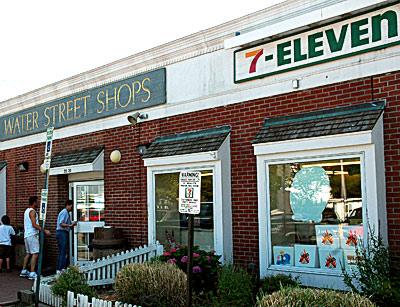Renewed Call For Limits On Chain Stores

Local regulations restricting chain or “formula” stores — never enacted here despite a longstanding general belief that they exist — are becoming a topic of discussion with the introduction by New York State Assemblyman Fred W. Thiele Jr. of state legislation that would make it clear that municipalities can limit such stores, and East Hampton Town Councilwoman Sylvia Overby’s plan to ask the town board to consider formula store rules.
Towns and villages in New York have refrained from putting chain store laws in place because of questions about whether the state law that gives localities zoning powers allows such regulations.
Until recently, land use restrictions in East Hampton Town’s zoning code, as well as market factors such as the cost of real estate and the size of the population here, have prevented the establishment of the chain stores seen increasingly in communities across the nation.
There are few locations, for instance, where a fast food restaurant, as defined by the town’s code, could be sited.
But a new 7-Eleven store in Montauk and continual rumors about other chains looking to open stores or restaurants here prompted the Montauk Citizens Advisory Committee to take up the issue.
In a letter sent last month to its town board liaison, Councilman Dominick Stanzione, and copied to Assemblyman Thiele, the group asked that the councilman “bring up the subject of regulating formula stores in our community,” research the use of regulations used in other towns, and work with state officials “to see what can and can’t be done.”
In a response sent to Lisa Grenci, the Montauk committee’s chairwoman, Mr. Thiele said that “a growing number of towns across the nation are enacting policies that restrict the proliferation of ‘formula businesses,’ ” which are described as “stores and restaurants that have standardized services, decor, methods of operation, and other features that make them virtually identical to businesses elsewhere.”
The assemblyman’s draft legislation describes such businesses, which have 10 or more locations in the United States, as “formula retail” uses, and provides that local zoning regulations “may include the regulation, restriction, or prohibition of formula retail uses . . . pursuant to a comprehensive plan and a valid public purpose.”
Noting that “many formula retailers and restaurants are increasingly locating in downtown and neighborhood business districts,” often arriving “en masse,” Mr. Thiele wrote in his letter to the Montauk committee that the result can be a “speculative run-up in rents” and “long-term economic consequences as the downtown or neighborhood business district loses its distinctive appeal or historic character.”
Some towns, Mr. Thiele wrote, have adopted ordinances that either prohibit formula businesses, cap their total number, or require that they meet certain conditions. In New York, however, only the village of Port Jefferson has done so, and, according to Mr. Thiele, it has failed to enforce the law.
Mr. Thiele says that, in several cases, a court ruled that restricting formula stores does not violate the Constitution’s Commerce and Equal Protections Clauses, but is a legitimate way of preserving distinctive community character.
Councilwoman Overby suggested at a meeting Tuesday that the board discuss the issue at its work session next week. Before being elected, she said, she had researched and compiled information about the issue, and covered it in a “Guestwords” column for The Star.
She told board members that she had distributed the information to members of the press, prompting criticism that quickly became partisan from both Supervisor Bill Wilkinson and Councilwoman Theresa Quigley.
“I find it just totally duplicitous,” Mr. Wilkinson said, complaining that the information had not yet been made available to the board. Ms. Quigley seconded that comment.
“It is to start the discussion,” with both the board and the public, Ms. Overby replied.
“I find it absurd, the number of things that happen behind closed doors, that somehow is okay because it’s a particular party,” Ms. Quigley said. “I do things with your approval and somehow they become ‘secret meetings.’ ”
“Are you suggesting that board members shouldn’t put out to the press an initiative that they want to pursue?” asked Councilman Peter Van Scoyoc. The argument continued and became heated, with each side complaining of improper behavior by the other.
As to the question of regulating formula stores, however, Ms. Quigley said, without knowing exactly what Ms. Overby would propose, she did not see a need to do so.
